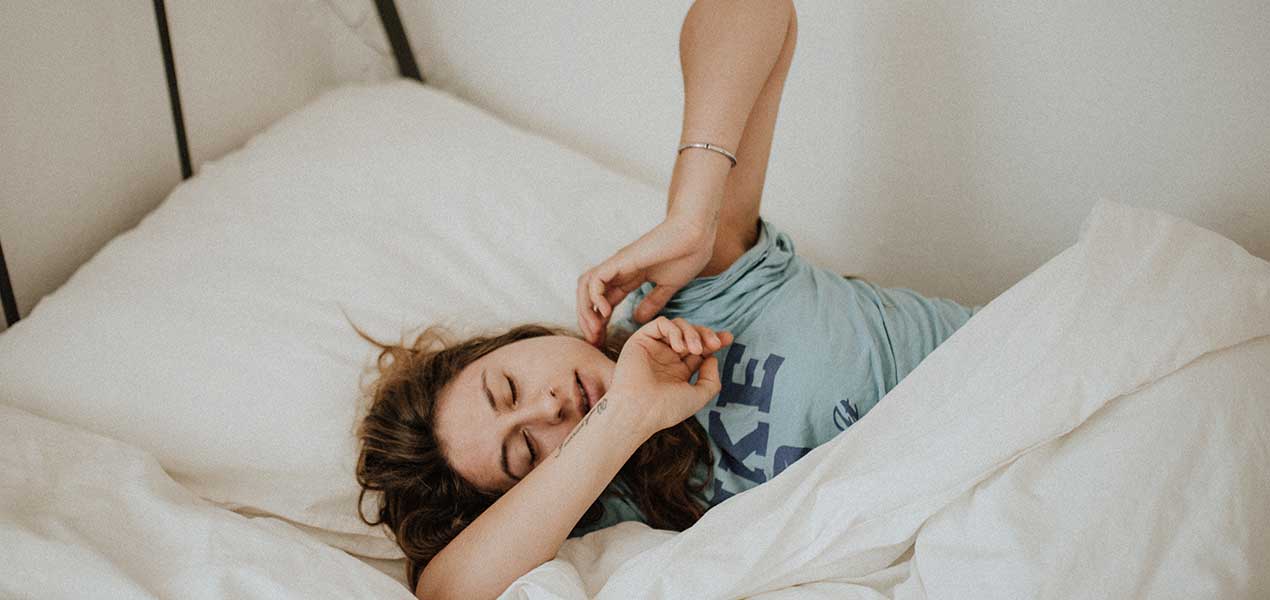
Your body is nearly two-thirds water.

Much has been written about how lifestyle and our sleep environment can influence how well we sleep at night. What we eat and drink in the evening or during the night should also be considered. While there is no “one size fits all” solution, there is evidence showing that some foods and drinks act as sleep promoters, while others can be sleep disruptors.
Which foods are good for sleep?
Foods reported to be good for promoting sleep include bananas, nuts, peanut butter, jasmine rice, whole grains, complex carbohydrates (slow digesting healthier carbs), herbs such as sage or basil, Valerian-containing tea, and dairy products including milk, cheese, and yogurt (watch the sugar here!).
Honey has also been shown to be sleep promoting, so perhaps some honey with natural yogurt would be a good and healthy option before bed. Cottage cheese is another option as it is high in casein protein, which is a slow digesting protein. This is important since your body will not be taking nourishment for the next 8-12 hours. Consider these foods as good snack options in the evening.
Tart cherry juice has been reported to increase melatonin levels which in turn helps induce sleep, but keep in mind you are taking in some added sugar. Tart cherry extract, as a dietary supplement, is the most potent way to get it.
Is turkey the magic sleep food?
One of the most common beliefs is that a lot of turkey must be good because we all get so sleepy on the sofa after Christmas dinner. Well, this is only partially true.
Turkey, and some other proteins such as chicken and fish contain high levels of tryptophan, but the effect of the tryptophan for sleep is very slow. What really helps makes you sleepy is ingesting some non-sugary carbohydrates in the evening.
These, in combination with the tryptophan you already have stored up, increase serotonin levels which can lead to better sleep. So, have some wholegrain bread or bagel with your turkey!
Will alcohol help me sleep better?
Alcohol is a tricky one. One of the initial effects of alcohol is to make us feel sleepy because it is a central nervous system depressant. For this reason some people use it as a quick and easy way to help get to sleep. However, midway through the night, as you withdraw from the alcohol and it gets converted to sugar, you are more prone to wake up. The rest of the night can be very fitful and restless. Poor sleep quality is not something you may even be consciously aware of, but it interferes with the body’s ability to recover and restore itself. To limit the negative effects of alcohol on sleep, restrict your consumption to a few days a week and try to have your last alcoholic beverage about 3 to 4 hours before bedtime.
Steer clear of these foods before bed
Generally foods high in saturated or trans fats, sugar, salt or that are particularly “heavy” tend to be poor for sleep. Saturated and trans fats reduce serotonin levels. Serotonin is one of the most critical brain chemicals for sleep. Sugary foods before bed will cause an insulin spike during sleep, thereby disrupting the sleep.
Salty foods should be avoided near bedtime as salt intake may cause an increase in blood pressure which leads to less deep sleep and more nighttime awakenings. Salty foods can also have a dehydrating effect which is not ideal given that fluid intake should be lessened as bedtime approaches in order to avoid frequent trips to the restroom during the night.
Heavy meals late in the evening stimulate digestion which tends to cause disrupted and restless sleep and they can also trigger acid reflux in some people at night which also may interfere with sleep. In this regard, spicy foods should also be avoided too close to bedtime.
Curbing the caffeine
Most of us are aware that caffeine containing foods are a no-no for sleep. Things like coffee, caffeinated teas, energy drinks, and chocolate are stimulants and should certainly be avoided for at least the 4 hours leading up to bedtime. If you are having a particularly hard time falling asleep most nights, your caffeine consumption should end by lunchtime.
Insomnia increases the risk of panic disorder by 20 times